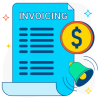Cash Flow Management in Business – The Real Game Changer
We at NNCA have worked with hundreds of businesses across the UAE, and if there’s one key factor that makes or breaks a business, it’s cash flow management. You might be turning a profit on paper, but without available cash in hand to pay employees, suppliers, or government dues, you’re risking operational paralysis.
Especially in Dubai and the broader UAE market, where credit cycles are lenient yet regulatory timelines are strict, the ability to manage your cash effectively can determine whether you scale or stall.
This blog unpacks what cash flow management is and what cash flow management strategies are. Why they are crucial, and how UAE-based businesses can get it right.
What Is Cash Flow Management and Why Does It Matter?
Cash flow refers to the movement of money into and out of your business. Cash flow determines your day-to-day operational capability, whether from customer payments, loan disbursements, vendor bills, or payroll.
Effective cash flow management in business means forecasting future needs, maintaining visibility over inflows and outflows, and ensuring you can meet both short-term obligations and long-term goals. It’s your buffer against uncertainty and your engine for growth.

Understanding Cash Flow: A simple breakdown
Interestingly, your focus is not on money here but on how your business should run and how to use money to create safety against unseen future hazards. Hence, Cash Flow is best understood when broken down into categories that affect the business the most.
Here’s a breakdown of its three main types:
Type of Cash Flow:

Operating Cash Flow:
Money from your core business operations (sales, services).

Investing Cash Flow:
Cash used for buying or selling long-term assets like equipment or real estate.

Financing Cash Flow :
Capital is raised from loans or investors, and repayments are made.
While all three impact your financial health, operating cash flow is the most immediate and visible sign of business viability.
Why Cash Flow Management in Business Is Crucial in the UAE
UAE, while tax-friendly, is also firm on compliance:
- –Introducing its new regulations, such as the 9% corporate tax
- -Stringent enforcement of the Wage Protection System (WPS)
have underscored the importance of maintaining healthy cash flow. Hence its crucial to know how to manage your money in business.
Key Reasons for Prioritising cash flow management in business:
Regulatory Compliance:
Timely cash flow ensures businesses meet their tax obligations, including the newly implemented corporate Tax and existing VAT requirements, avoiding penalties and fostering good standing with regulatory bodies.

Employee Satisfaction:
Adherence to WPS mandates timely salary payments. Delays can lead to penalties ranging from AED 1,000 to AED 5,000 per employee and damage employee morale.

Operational Efficiency:
Adequate cash flow allows for uninterrupted operations, including inventory procurement, service delivery, and the ability to seize growth opportunities without financial constraints.

Financial Resilience:
Strong cash reserves enable businesses to navigate economic fluctuations, such as those experienced during global events, without compromising stability.
Consequences of Poor Cash Flow Management:

Delayed Salary Payments:
Non-compliance with WPS can result in substantial fines and restrictions on obtaining new work permits.

Missed Tax Deadlines:
Failure to meet corporate Tax and VAT deadlines can lead to penalties, though recent initiatives have introduced waivers for late corporate tax registration under specific conditions.

Inventory Shortages:
Inadequate cash flow can hinder the ability to restock inventory, affecting sales and customer satisfaction.

Strained Vendor Relationships:
Late supplier payments can damage relationships, leading to less favourable terms or supply disruptions.

Emergency Borrowing:
Businesses may use high-interest loans to cover shortfalls, increasing financial strain
In conclusion, healthy cash flow management is essential for compliance, operational efficiency, and long-term success in your business.
Symptoms of Poor Cash Flow Management
Some signs we at NNCA commonly observe in struggling businesses include:
| Warning Sign | What It Means |
|---|---|
| Constantly using overdrafts | You’re spending beyond your means |
| Late salary payments | Poor liquidity management; potential MOHRE penalties |
| Over-reliance on a few large clients | Revenue isn’t diversified; delays can freeze operations |
| Frequent supplier disputes | Cash crunch leads to unpaid bills |
| Missed VAT deadlines | Risk of penalties and audits |
Connect the dots! Take help on understanding your finances better! Read:
DO YOU NEED A FORENSIC OR INTERNAL AUDITOR? KNOW MORE, KNOW BETTER!
Step-by-Step Cash Flow Management Strategies for UAE Businesses
At NNCA, we often advise clients that effective cash flow management in business is about implementing consistent, practical strategies. Here’s a step-by-step guide with actionable tips:
Step 1: Forecast Realistically
Begin with a rolling cash flow forecast. This forecast isn’t just an annual exercise; you must update it monthly or weekly.
- Include projected inflows (sales, collections, refunds, loans) and outflows (rent, salaries, VAT, supplier payments).
- Factor in UAE-specific obligations like quarterly VAT, upcoming corporate tax dues, and seasonal slowdowns (e.g., Ramadan or summer).
- Use historical data to predict trends and pre-empt any shortfalls.
Step 2: Tighten Your Accounts Receivable Process
Getting paid faster is one of the most effective ways to improve cash flow.
- Automate invoicing with tools like Zoho Books, QuickBooks, or Xero to reduce delays.
- Set shorter payment terms, 15 or 30 days instead of the default 60-90 days.
- To encourage clients, offer small early payment discounts (e.g., 2% off if paid within 7 days).
- Follow up regularly with gentle reminders, and don’t hesitate to escalate if needed.
Step 3: Negotiate Better Terms with Suppliers
You can manage your outflows more flexibly if you have good supplier relationships.
- Ask for extended payment periods (45–60 days), especially with large or long-term vendors.
- Negotiate staggered or instalment-based payments for high-ticket purchases.
- Consider consignment stock arrangements if you’re in retail or distribution, reducing upfront inventory costs.
Step 4: Manage Inventory Smartly
Inventory is often where cash hides, especially in the UAE’s retail, food and beverage, and construction sectors.
- Avoid over-ordering. Focus on only stocking what sells fast or is required for immediate delivery.
- Monitor inventory turnover ratios using ERP or cloud-based accounting tools.
- Clear out dead stock through promotions or bundled offers to free up liquidity.
Step 5: Control Overhead Expenses
Reducing recurring operational costs, even slightly, can significantly improve cash flow.
- Review your monthly software subscriptions, outsourced services, and utilities for potential cuts.
- Re-evaluate office space—can some teams work remotely, or can the space be downsized?
- Renegotiate terms with service providers like internet, cleaning, or leasing partners annually.
Step 6: Use Short-Term Financing Strategically
Cash flow management strategies include planning short-term finance. A well-planned loan is sometimes better than cash flow chaos, especially when critical obligations like payroll or tax payments are due.
- Apply for working capital loans or revolving credit lines when business is stable, not during a crunch.
- Use business credit cards or overdraft facilities only to bridge timing gaps, not to fund ongoing losses.
- Always factor in interest rates and repayment timelines to avoid ballooning liabilities.
By following these steps with discipline and foresight, your business can move from surviving month to month to planning confidently for growth. And remember—NNCA offers accounting services in Dubai that can help automate, monitor, and optimise every step of this process. Let’s build a cash flow system that works for you.
The Role of Technology in Cash Flow Management
Today, technology is an inevitable part of running a business. Technology and AI are powerful in any strategic planning, including cash flow management strategies. At NNCA, we help clients implement tools like Zoho Books, QuickBooks, and other cloud-based platforms to:

Automate invoicing and reminders

Generate weekly or monthly cash flow reports

Sync with bank feeds for real-time monitoring

Flag red zones in cash buffers
This automation ensures accuracy, speeds up decision-making, and reduces manual oversight.
UAE-Specific Considerations for Cash Flow Planning
In the UAE, several unique factors influence how you should approach your cash flow:
| Factor | Impact on Cash Flow |
|---|---|
| VAT Compliance | Businesses must set aside 5% of taxable income, impacting liquidity. |
| Corporate Tax (from 2023) | New 9% tax obligations mean cash planning for quarterly and annual dues. |
| Industry Payment Norms | In construction or trading, delayed client payments are common. |
| Seasonality: | Summer months and Ramadan may slow down receivables or increase costs. |
A note on VAT & TAX in UAE:
VAT Payments
VAT is due quarterly or monthly, based on your FTA schedule. Many businesses forget to set aside VAT collected, treating it like revenue.
Corporate Tax
With the new 9% corporate tax, quarterly advance payments and annual filings will now affect your cash position. Improper planning can lead to penalties.
Tip: Always hold VAT and corporate tax amounts in a separate account. Understanding and adapting to these local conditions is vital.
Sample Cash Flow Forecast Table
| Month | Cash Inflows (AED) | Cash Outflows (AED) | Net Flow (AED) | Opening Balance (AED) | Closing Balance (AED) |
|---|---|---|---|---|---|
| January | 5,00,000 | 4,50,000 | 50,000 | 1,00,000 | 1,50,000 |
| February | 3,00,000 | 3,50,000 | -50,000 | 1,50,000 | 1,00,000 |
| March | 4,50,000 | 4,00,000 | 50,000 | 1,00,000 | 1,50,000 |
Forecasting allows you to anticipate trouble and act early, such as delaying expenses, taking short-term credit, or fast-tracking receivables.
How Accounting Services in Dubai Can Help
At NNCA, we work with businesses in all the Emirates, including Dubai. Our practice that honors speed, compliance, and scale is critical for our customers.
Our accounting services in Dubai help to:
- Build real-time dashboards showing your daily cash position
- Set automated alerts for low cash thresholds
- Create rolling 3–6 month forecasts
- Track upcoming liabilities like rent, VAT, and payroll
- Integrate bank feeds to monitor payment lags
By outsourcing your accounting, you’re not just managing numbers—you’re managing peace of mind.

FAQs About Cash Flow Management in Business in the UAE
Q1. What is the difference between profit and cash flow?
Q2. Is cash flow more important than profit?
Q3. Do I need software for cash flow tracking?
Q4. How can I improve collections from clients?
Cash Flow Isn't Just a Metric—It's a Mindset
If you’re operating in Dubai or elsewhere in the UAE, mastering cash flow management in business is one of the most potent ways to build long-term stability and profitability. From managing risks to fuelling growth, your cash position tells the story of your company’s health.
Get Expert Help with Cash Flow: Accounting Services in Dubai
Your cash flow management in business is not a one-time task—it’s a continuous process. That’s why many UAE companies partner with expert firms like us.
Ready to Strengthen Your Cash Flow?
We at NNCA bring decades of experience in accounting services in Dubai to help you monitor, plan, and strengthen your business cash flow. Let’s build your cash strategy together—accurate, timely, and compliant.
Contact us today for an NNCA consultation. Your cash flow matters—let’s make sure it flows right.




